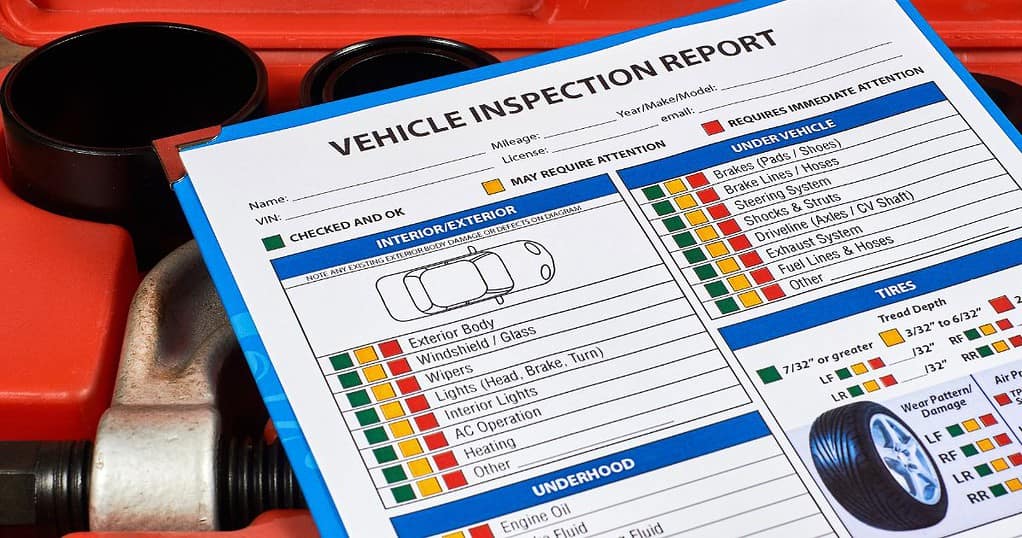VIN Vehicle History Reports: CarFax vs AutoCheck
When purchasing a used car, obtaining a vehicle history report (VHR) is a crucial step in ensuring you are making a well-informed decision. Two popular providers of VHRs are CarFax and AutoCheck. Each of these companies offers comprehensive reports containing important information about a vehicle’s past, such as accident history, previous owners, and maintenance records. But which one is the better choice?

CarFax and AutoCheck have their own unique advantages and drawbacks, so it’s essential to understand their differences before choosing one over the other. In this article, we’ll provide an in-depth comparison of these two VHR services to help you make the best decision for your needs.
What is a VIN?
A Vehicle Identification Number (VIN) is a unique 17-character code assigned to each vehicle that serves as its identifier. This code is like a vehicle’s DNA, providing crucial information about the car or truck. Manufacturers began using this numbering system in the 1980s to track and verify the authenticity of vehicles.
The VIN can be found in several locations on a vehicle, such as the driver’s side doorframe, the dashboard near the windshield, and on the engine block. Although this number is assigned during the manufacturing process, it can be used by law enforcement, insurance companies, and consumers when searching for information or verifying vehicle history.
The structure of the VIN is standardized and provides specific information about a vehicle. Here’s a breakdown of each section:
- Characters 1-3: World Manufacturer Identifier (WMI)
- Character 4-8: Vehicle Descriptor Section (VDS)
- Character 9: Check Digit
- Character 10: Model Year
- Character 11: Assembly Plant
- Characters 12-17: Vehicle Identifier Section (VIS)
Understanding the VIN is essential when accessing vehicle history reports, as it is the primary key to obtaining accurate and detailed information about a car or truck.
Vehicle History Reports Overview
Vehicle history reports are essential tools for car buyers and sellers, providing crucial information about used vehicles’ pasts. Among these reports, CarFax and AutoCheck are the two industry leaders. Both offer detailed and reliable information to help you make informed decisions when buying or selling a used car.
These reports include:
- Accident history and damage indicators
- Odometer readings and consistency
- Ownership history and number of owners
- Vehicle use (e.g., rental, personal, commercial, etc.)
- Title and registration information
- Recalls, repairs, and service records
- Structural damage or incorrect mileage indicators
Both CarFax and AutoCheck compile their data from various sources, including Department of Motor Vehicles (DMVs), insurance companies, collision repair facilities, and law enforcement agencies. Nonetheless, some discrepancies may exist between each provider’s report due to differences in data sources and report generation algorithms.
Comparing CarFax and AutoCheck can help you identify the factors that matter most to you when choosing which vehicle history report provider best meets your needs.
CarFax: Features and Pricing
CarFax is a well-known and popular choice for obtaining vehicle history reports. It offers a comprehensive insight into a vehicle’s past, covering various aspects such as title information, accident history, service records, and more.
Some key features of CarFax vehicle history reports include:
- Accident and damage history, including information on total loss and structural damage
- Title information, such as the number of previous owners, title brands, and ownership transfers
- Maintenance records from dealerships, independent repair shops, and service facilities
- Vehicle registration and mileage history
- Odometer readings and potential issues such as rollback or tampering
- Recall information and manufacturer warranties
CarFax offers three pricing options for its vehicle history reports. They are:
| Option | Number of Reports | Price |
|---|---|---|
| Single Report | 1 | $39.99 |
| Unlimited Reports (30 days) | Unlimited | $59.99 |
| Five Reports (60 days) | 5 | $99.99 |
While CarFax reports may be slightly more expensive compared to other providers, they are known for providing reliable and up-to-date information, which is vital when considering a used vehicle purchase.

AutoCheck: Features and Pricing
AutoCheck, owned by Experian, provides consumers and dealers with comprehensive vehicle history reports. Like CarFax, it gathers data from various sources, including title and registration records, insurance companies, and repair facilities. Some of its key features include:
- AutoCheck Score: A unique scoring system that evaluates a vehicle’s past based on its history and compares it to other vehicles in the same class.
- Title and registration history: Details about past owners, registration events, and title transfers.
- Accident history: Provides information on reported accidents and the severity, if available.
- Mileage: AutoCheck verifies the recorded mileage and checks for potential odometer rollback issues.
- Lemon and branded titles: Identifies vehicles that have been declared a lemon or have branded titles, such as salvage or flood damage.
AutoCheck offers both single-vehicle and multi-vehicle report packages. Single-vehicle reports can be purchased for $24.99, while multi-vehicle options are available at $49.99 for 25 reports or $99.99 for 300 reports, valid for 21 days.
Dealers and commercial customers can subscribe to AutoCheck on a per-vehicle basis or through a monthly subscription, with customized pricing options depending on the size and needs of the business.
While both CarFax and AutoCheck provide valuable information about a vehicle’s history, the choice between the two will depend on the specific features and pricing that best suit the needs of the consumer or dealer.
Section 6: Comparing CarFax and AutoCheck
Both CarFax and AutoCheck provide valuable information about a vehicle’s history, but they have their differences when it comes to the scope and presentation of their reports. In this section, we will compare key aspects of their services.
Data Sources: Both companies gather information from various sources, such as DMVs, repair shops, insurance companies, and auctions. However, CarFax claims to have a more extensive database, including exclusive partnerships with certain manufacturers and service providers. AutoCheck, on the other hand, has a strong relationship with Experian, a major credit reporting agency, which helps enrich its data.
Accident and Damage History: Both services offer details on any accidents or damage the vehicle may have sustained. CarFax tends to provide more detailed accident history, but AutoCheck offers the benefit of an “AutoCheck Score” which compares the vehicle’s history to similar models, allowing for a quick assessment of the vehicle’s condition.
Title and Ownership History: CarFax and AutoCheck both provide title and ownership history, including any title-related issues such as liens, repossessions, or salvage titles. Both services also offer information on how many previous owners a vehicle has had, and the length of time each owner held the vehicle. This can be useful in identifying potential issues based on ownership patterns.
Recalls and Warranty Information: CarFax often includes more comprehensive warranty and recall information in their reports, which can be helpful when evaluating the ongoing maintenance needs and costs of a vehicle. AutoCheck does provide some recall information, but it may not be as complete as CarFax’s data.
Ultimately, both CarFax and AutoCheck offer valuable insights into a vehicle’s history. You may want to use both services to get a more comprehensive understanding of a vehicle’s past and make an informed decision on your purchase.
Pros and Cons of CarFax
CarFax is a popular choice for obtaining vehicle history reports. Let’s take a look at the pros and cons associated with this service.
Pros:
- Reputation: CarFax is a well-established and trusted brand in the vehicle history report industry.
- Data sources: CarFax has access to a vast database, which includes data from thousands of sources, such as DMVs, insurance companies, and repair shops.
- User-friendly interface: CarFax’s website and reports are easy to understand and navigate, making it simple for users to access the information they need.
- Buyback guarantee: CarFax offers a buyback guarantee on their reports, providing additional confidence in the accuracy of the information provided.
Cons:
- Cost: CarFax tends to be more expensive than its competitors, such as AutoCheck, which could be a drawback for some consumers.
- Occasional data gaps: While CarFax boasts an extensive database, there may still be instances where information on certain incidents or repairs is missing or incomplete.
- Focus on major issues: CarFax primarily focuses on critical issues, such as accidents or title problems, which means that minor incidents may not appear on the report.
It’s essential to weigh the pros and cons of CarFax when deciding which vehicle history report provider to choose. Comparing CarFax to other options, such as AutoCheck, can help ensure you make an informed decision.
Pros and Cons of AutoCheck
AutoCheck, like CarFax, is a popular choice for obtaining reliable vehicle history reports. However, it has its own unique set of advantages and disadvantages that can influence a buyer’s choice when comparing the two services.
Pros:
- Lower cost: AutoCheck generally offers more affordable options for single and multiple reports compared to CarFax, allowing consumers to analyze the history of vehicles with a smaller budget.
- Unlimited plan: They provide an attractive unlimited plan, which allows potential buyers to check an unlimited number of VINs within a 30-day period – a valuable feature when searching for multiple vehicles.
- AutoCheck Score: The unique scoring system offered by AutoCheck evaluates the vehicle’s history on a scale of 1 to 100, making it easy for buyers to quickly assess its overall condition in relation to other similar vehicles.
- Data from Experian: As a subsidiary of Experian, one of the leading credit rating agencies, AutoCheck can provide trusted and accurate data on vehicle history reports.
Cons:
- Less detailed maintenance records: AutoCheck reports may have less comprehensive maintenance records compared to CarFax, which could be important for buyers who prioritize maintenance history.
- May miss some accident details: Although AutoCheck covers major accidents, it sometimes misses minor incidents or repairs that might be essential to consider before purchasing a used car.
- Lower brand recognition: Some buyers may be less familiar with AutoCheck as compared to CarFax, potentially requiring extra research to understand its features and benefits.
Which is Better: CarFax or AutoCheck?
Choosing between CarFax and AutoCheck ultimately depends on your specific needs and preferences. Both companies provide essential information on the history of vehicles, but their approach and additional services can differ.
CarFax highlights:
- Comprehensive and detailed reports
- Offers information on maintenance and service history
- User-friendly interface
- Multiple report package options
AutoCheck highlights:
- More affordable options for single and multiple reports
- AutoCheck Score – an easy-to-understand indicator of potential issues
- Features a Buyback Protection program
- Used and trusted by industry professionals
Consider the following factors when making your choice:
| Factor | CarFax | AutoCheck |
|---|---|---|
| Price | More expensive | More affordable |
| Report Detail | More extensive | Sufficient, but less extensive |
| Maintenance History | Included | Limited |
| Overall Ease of Use | User-friendly | Can be more technical |
If you value extensive maintenance history and user-friendly reports, CarFax may be a better option. However, if affordability is a priority, AutoCheck offers sufficient information at a lower cost. Ultimately, the best choice will depend on individual priorities and preferences.
Conclusion
In comparing CarFax and AutoCheck, both services offer valuable information for potential car buyers. Each has its strengths:
- CarFax: Known for detailed accident reports, maintenance records, and owner history.
- AutoCheck: Recognized for the AutoCheck Score, which provides an easy-to-understand vehicle rating.
However, there are a few drawbacks to consider:
- CarFax: Can be more expensive and may not include smaller accidents or repairs.
- AutoCheck: Might lack the extensive maintenance records provided by CarFax.
Ultimately, the choice between CarFax and AutoCheck will depend on your specific needs and budget. It’s often recommended to use both services to gain a comprehensive understanding of the vehicle’s history before making a purchase.
